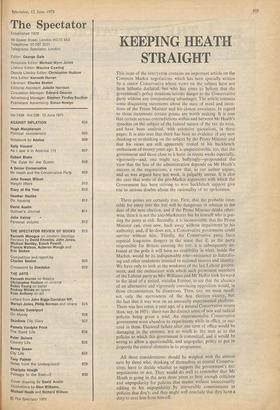KEEPING HEATH STRAIGHT
This issue of the SPECTATOR contains an important article on the Common Market negotiations which has been specially written by a senior Conservative whose views on the subject have not been hitherto declared, but who has come to believe that the government's policy threatens serious danger to the Conservative party without any compensating advantages. The article contains some disquieting statements about the state of mind and inten- tions of the Prime Minister and his closest associates. In regard to those statements certain points are worth making. It is true that certain serious contradictions within and between Mr Heath's speeches on the subject of the federal nature of the EEC do exist, and have been analysed, with extensive quotations, in these pages. It is also true that there has been no evidence of any new thinking or re-thinking on the subject by the Prime Minister and that his views are still apparently rooted in his backbench enthusiasm of twenty years ago. It is unquestionable, too, that the government and those close to it have, in recent weeks especially, vigorously—and, one might say. bullyingly—propounded the view that the fate of the administration depends on Mr Heath's success in the negotiations, a view that, as our author argues, and as was argued here last week, is palpably untrue. It is also the case that some of the pro-Market arguments with which the Government has been striving to woo backbench support give rise to serious doubts about the rationality of its spokesmen.
Three points are certainly true. First, that the probable time- table for entry into the EEC will be dangerous in relation to the date of the next election, and if the Prime Minister thinks other- wise, then it is not the anti-Marketeers but he himself who is put- ting the party at risk. Secondly. it is incontestable that the Prime Minister can, even now, back away without impairment 'to his authority; and, if he does not, a Conservative government could survive without him. Thirdly, the Conservative party faces especial long-term dangers in the sense that if, as the party responsible for Britain entering the EEC. it is subsequently de- feated at the polls it will have no credibility in what, inside the Market. would be its indispensable role—resistance to federalis- ing and other tendencies inimical to national interest and identity. We have only to look at the weakness of the last Labour govern- ment, and the enthusiasm with which such prominent members of the Labour party as Mrs Williams and Mr Helfer look forward to the ideal of a united, socialist Europe, to see that the absence of an alternative and vigorously convincing opposition would, in those circumstances, be disastrous. Then, too, we must recall, not only the narrowness of the late election victory, but the fact that it was won on an unusually experimental platform. There was less sense, a year ago, of a natural Conservative return than, say, in 1951: there was the distinct sense of new and radical policies being given a trial. An experimentalist Conservative government must abandon its experiments while in office, or suc- ceed in them. Electoral failure after one term of office would be damaging in the extreme, not so much to the men as to the policies to which this government is committed, and it would be wrong to allow a questionable, and unpopular, policy to put in jeopardy the central elements in its programme.
All these considerations should be weighed with the utmost care by those who, thinking of themselves as central Conserva- tives, have to decide whether to support the government's EEC negotiations or not. They would do well to remember that Mr Heath is going in the next three years to bear enough criticism and unpopularity for policies that matter without unnecessarily adding to his unpopularity by irreversible commitments to policies that don't; and they might well conclude that they have a duty to save him from himself.


































 Previous page
Previous page